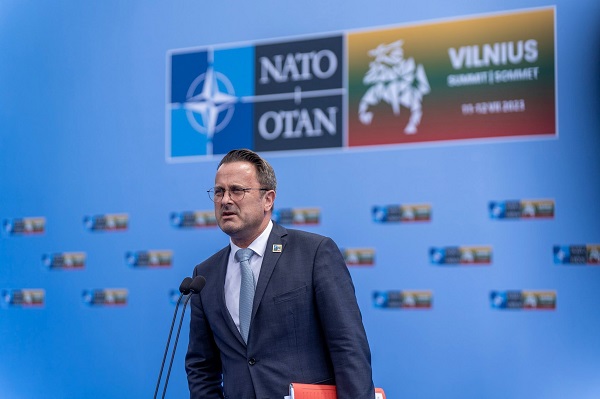 Xavier Bettel, Luxembourg's Prime Minister;
Credit: ME
Xavier Bettel, Luxembourg's Prime Minister;
Credit: ME
On Tuesday 11 and Wednesday 12 July 2023, Luxembourg's Prime Minister Xavier Bettel, the Deputy Prime Minister and Minister of Defence, François Bausch, and the Minister of Foreign and European Affairs, Jean Asselborn, took part in the NATO Summit in Vilnius, Lithuania.
As noted by Luxembourg's Ministry of State, the Ministry of Foreign and European Affairs and the Directorate of Defence, discussions focused on defence investments, the strengthening of the deterrence and defence posture with three new regional plans, Sweden's membership of NATO, continued support for Ukraine and NATO-Ukraine relations, as well as partnerships with Australia, South Korea, Japan and New Zealand.
Faced with the new and deteriorated security context in Europe, the Heads of State and Government approved the new plans aimed at strengthening the deterrence and defence posture of NATO. Through three regional plans - for the North, Centre and South of the Euro-Atlantic zone - NATO is evolving from a logic of "advanced presence" to one of "advanced defence". The new collective defence model follows a 360-degree approach on land, in the air, at sea, in cyber and in space, combined with a new force structure and a proper command and control.
Moreover, the leaders of the NATO countries adopted a more ambitious "Defence Investment Pledge", fixing the objective of 2% of the gross domestic product (GDP) as a baseline. Taking into account NATO's principle of reasonable effort and the specificity of the Luxembourg economy, characterised by a GDP per capita above the average of other NATO member states, gross national income (GNI) will be applied exceptionally in Luxembourg instead of GDP.
"Consequently, and in a true spirit of unity and solidarity, Luxembourg has, in an unprecedented effort, subscribed to the Vilnius commitment in terms of defence, setting 2% as a baseline and aiming to reach, in time, the [goal of] 2% of its GNI," stated Minister Bausch. "We will also continue to strengthen the Alliance in the areas of cyber, space and emerging and disruptive technologies, three essential national priorities."
The NATO leaders also approved the "Defence Production Action Plan" which aims to strengthen the production capacity of the defence industry of the allied countries. In this context, Luxembourg highlighted the central role of the Capellen-based NATO Support and Procurement Agency (NSPA).
At the centre of the discussions was also the Russian war of aggression against Ukraine as well as NATO-Ukraine relations. In this context, the Heads of State and Government decided to continue developing the Comprehensive Assistance Package for Ukraine into a multi-year programme. This package aims to strengthen Ukraine's deterrence and defence in the short, medium and long term, bringing the country closer to NATO standards, facilitating interoperability with NATO and contributing to the reconstruction of the Ukrainian security and defence sector. Since the 2022 Madrid Summit, allies and partners have committed more than €500 million under this programme; Luxembourg contributed a total of €11.4 million.
Luxembourg also reaffirmed its resolute support for Ukraine. So far, the former has delivered lethal and non-lethal military equipment worth €90 million to the latter, and equipment worth €127.4 million is under contract. Prime Minister Bettel emphasised in particular, during the NATO-Ukraine Council which met for the first time, that Luxembourg continues to support Ukraine, including at the level of rapprochement between Ukraine and NATO.
Luxembourg's Prime Minister welcomed the participation of Indo-Pacific partners and EU representatives during the second meeting of NATO leaders on Wednesday morning. He particularly noted that security in the Euro-Atlantic region and that of the Indo-Pacific region are interdependent.
On the sidelines of the 2023 Vilnius Summit, Minister Bausch signed a declaration to set up a joint coalition for the training of the Ukrainian Air Force in the operation and maintenance of F-16 combat aircraft. The other parties to the coalition are Belgium, Canada, Denmark, Norway, the Netherlands, Poland, Portugal, Romania, Sweden and the United Kingdom. The parties agreed to start the training of pilots, technicians and support personnel of the Ukrainian Air Force, enabling the operation, servicing and maintenance of F-16 fighter jets.
Minister Bausch also signed a memorandum of understanding establishing the NATO Climate Change and Security Centre of Excellence (CCASCOE). Luxembourg will fill an expert position at the new centre of excellence through a service contract with an interested think tank or research institution.
For his part, Minister Asselborn took part in the informal meeting of NATO Foreign Ministers with their counterparts from Bosnia and Herzegovina, Georgia and Moldova, which provided an opportunity to take stock of the situation in those countries which are particularly affected by the destabilising pressures and actions of Russia.
Minister Asselborn welcomed the decision taken by the Turkish government to no longer block Sweden's accession to NATO, expressing his hope that the ratification process will be completed as soon as possible.








